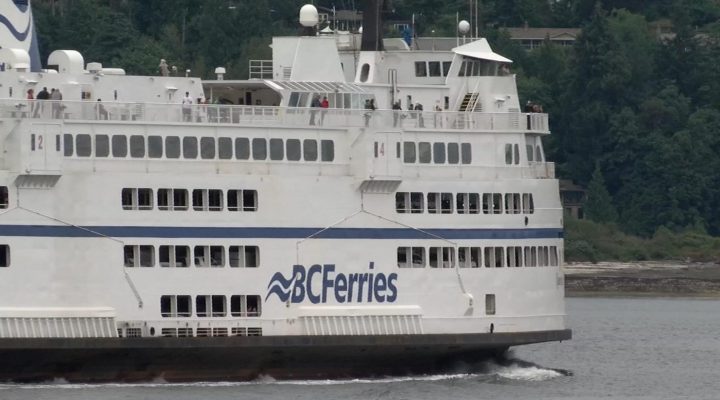

BC Ferries said vehicle traffic levels are the highest ever. File photo.
BC Ferries’ net losses were $3.7 million for the three months ending Dec. 31, 2018, $11. 1 million less than the $14.8 million reported in the same quarter last year.
BC Ferries posted its third-quarter results on Friday for the fiscal year ending March 31, 2019.
The results state that in the three months ending Dec. 31, 2018, BC Ferries did more than 42,000 sailings, an average of 466 sailings per day for its customers. The company carried 4.7 million passengers and 2twomillion vehicles, an increase of 1.7 per cent and 2.6 per cent respectively, compared to the same quarter in the prior year.
These passenger traffic levels are the highest the company has seen in over 20 years and vehicle traffic levels are the highest ever experienced.
“We are expecting to have a busy year as we carry record high levels of traffic, deliver new vessels and commence major construction projects, while continuing to provide the best possible
service to ferry users,” Mark Collins, BC Ferries’ President and CEO, said in a statement.
BC Ferries said due to the seasonality of ferry travel, BC Ferries typically generates higher net earnings in the first and second quarters (spring and summer), which are then reduced by net losses in the third and fourth quarters. The organization also does vessel refits and major maintenance programs on its fleet during the fall and winter months.
Year-to-date net earnings were $93.2 million, $7.7 million lower than the same period last year. BC Ferries said the lower results reflect a reduction in fares, additional sailings, costs associated with the reintroduction of the Spirit of British Columbia following its mid-life upgrade and service enhancements.
Capital expenditures in the three and nine months periods ending Dec. 31, 2018 totalled $45 million and $171.8 million, respectively. In the nine months ended Dec. 31, 2018, the total
spent in British Columbia was approximately $105 million with firms such as Esquimalt Drydock Company, Fraser River Pile & Dredge (GP) Inc., Point Hope Maritime Ltd., Vancouver Drydock Co., and Vancouver Shipyards Co. Ltd., as well as at BC Ferries’ own maintenance facility in Richmond.
In the three and nine months ending Dec. 31, 2018, $11.3 million in grant funding was recorded ($0.8 million from FortisBC in the three months ended Dec. 31, 2018 and $10.5 million from the federal New Building Canada Fund in the nine months ended Dec. 31, 2018.
Future Plans
In the spring, the Spirit of Vancouver Island will go back into service with the liquefied natural gas propulsion system and mid-life upgrade. This fall, there will be two new Island Class vessels with hybrid diesel-electric propulsion delivered. BC Ferries said the 81-metre ships will be built to be capable of conversion to all-electric propulsion as the technology permits and the infrastructure becomes available.
The vessels will carry 450 passengers and crew and approximately 47 vehicles. They will run on the Texada Island – Powell River and Port McNeill – Alert Bay – Sointula Island routes in
2020.
The terminal at Texada Island will be upgraded to handle the Salish Class vessels in the spring. In the fall, there will also be a bi-weekly pilot service with a triangle run between Comox, Texada Island and Powell River.
“Another major capital investment expected to start later this year is our Langdale terminal redevelopment project, which includes the long-anticipated construction of an overhead foot
passenger walkway,” Collins said.
The project incorporates a new terminal building, a ticketing plaza as well as parking lot and pick-up and drop-off area upgrades.
“The entire project is expected to be finished within three years and will improve the travel experience, increase on-time performance and improve safety at the terminal,” Collins said.
In the fall of 2018, BC Ferries filed its Performance Term Five Submission to the British Columbia Ferries Commissioner. The submission provides information to assist the commissioner to establish price caps for all regulated routes as specified in the Coastal Ferry Services Contract, for the period of April 1, 2020 – March 31, 2024. The commissioner will release his preliminary ruling by March 31, 2019, with the final ruling expected by September 30, 2019.
The submission includes BC Ferries’ 12-year capital plan, which itself has plans to invest more than $3.9 billion.
“The capital plan emphasizes more system capacity, operational efficiency, resiliency and travel certainty. These are the things ferry users tell us they want,” Collins said.



